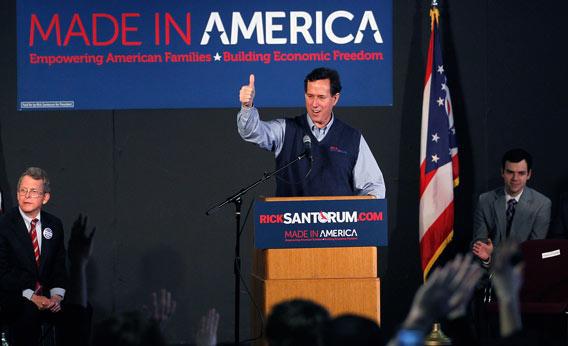Zanesville, Ohio—I am my campaign. That was Rick Santorum’s message at the Dayton Christian School in Miamisburg, Ohio, the day before Super Tuesday. The former Pennsylvania senator recounted how pundits had sniffed at him and how he’d been down in the polls for so long. But he slogged on, as he does today, even though he says he’s being outspent 12-to-1 in this key battleground state. Only someone who could muscle through so much adversity can beat Barack Obama, he tells the crowds. As another sign of his determination, Santorum says he has turned down job offers and spent his life savings to run this race. “I come to the people of Ohio as a candidate who shouldn’t be here,” he said. “But we’re here for a reason, because of … enthusiasm and grit. Growing up in a steel worker town, growing up having to fight for everything you got is exactly the kind of person we need to have not just in the White House … but in this election. Not someone who can buy it, but someone who knows you have to earn it. You have to fight for America.”
It’s a good story. This is what Americans want in their politics and their movie heroes. We root for truth triumphing against all odds. We want Rocky Balboa to win the fight. It is the story of America, as Santorum points out at an American Legion hall in Westerville later in the day—the story of his grandfather who worked in the coal mines to build a better life. The question going into Super Tuesday is whether Republicans will back the plucky underdog with the good story or Mitt Romney, the polished, well-financed much-anticipated champion who is pounding him at every commercial break on television. The answer will determine whether Santorum leaves Ohio with a new shot at the presidency or a steak on his eye and an A for effort.
Right now the polls show a tight race. On Monday, four new ones came out—NBC Quinnipiac, CNN, and Suffolk University—and each one showed a tie or a tie within the margin of error. Still, pollsters and GOP insiders seem to think Romney has the momentum, as Santorum’s lead has shrunk in recent days. Then again, momentum has meant very little in this campaign.
Santorum gives a rousing speech that’s much better than the one Mitt Romney offers. He meanders sometimes, as if he’s trying to check every Obama outrage off his list. But his talks have an appealing structure and rhythm. Here’s the short version, delivered using Santorum’s favorite speaking tic: I shouldn’t have made it so far, but I have. Why? Because I speak the truth about Obama’s government overreach. Why? Because I am the true conservative in this race. Why? Because I’m one of you. Why? Because I am the grandson of a coal miner who came to America and made a better life for himself. Why? Because America is the beacon of freedom and opportunity on the earth. Why? Because people who held convictions tight and didn’t let go fought despite all the odds—the way I am now in this campaign.
At his packed Ohio rallies, voters in winter coats whistle as they applaud this tale of principle, faith, and truth against identifiable foes: the media, the establishment, and the timid. He’s got the rank-and-file conservatives, evangelical voters, and Tea Party stalwarts. For these voters, his candidacy is exciting. But Santorum’s challenge in Ohio is to reach beyond his base. What’s hard to divine is whether he is lighting a brushfire or simply preaching to the choir? Is he reaching voters concerned about the economy? Can he win over voters who care most about beating Barack Obama?
At these final rallies before Super Tuesday, Santorum tries to answer those questions. He will draw the starkest contrast with Barack Obama on the issue of health care and government overreach. Only with a Republican candidate who offers clear contrasts will general election voters be tempted to turn away from Obama. But it’s a bank shot. Santorum has an economic plan centered around lower taxes and a zero percent tax rate for manufacturers, but the rhetoric and passion that gets his crowds worked up isn’t about the economy. The enthusiasm and energy at his rallies is for his rock-solid social conservatism, which may be why he has had trouble reaching those voters for whom the economy is the central issue. On the eve of the vote, Santorum seemed to be feeling the limitations of his own reach, redefining victory for ABC’s Jonathan Karl. “We’re winning,” Santorum said. “Whether we end up with the most votes or not [in Ohio], we’re winning.”
To fight through the current wave of negative attacks, Santorum could use Mitt Romney’s focus. The former governor rarely wavers from making his central case that his private sector experience gives him a special insight into the economic problems of the day. For Romney, focus is both a tactic and his message: “Sometimes we got involved in businesses that were in trouble. We used to have … three rules for turning around an enterprise in trouble, and the rules were these: focus, focus, and focus. Focus your energy on those things that are most important, focus on your key customers, get your best products out to the people who need those products. Make those products the best in the world: focus.”
Romney gets to values issues through his economic pitch. Santorum does the reverse. It certainly doesn’t make Romney’s audiences as emotionally invested as Santorum’s Rocky Balboa underdog story makes his. But for an electorate that has consistently listed beating Barack Obama as its top priority, it’s worth remembering that in the end, Rocky lost and Apollo Creed won.
